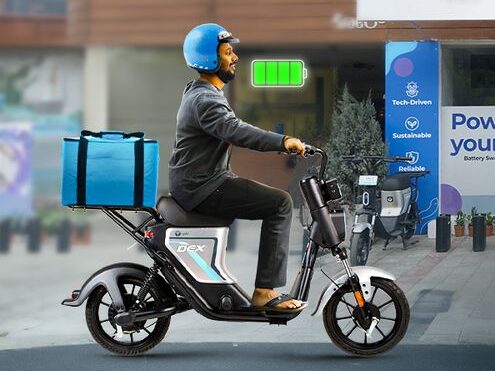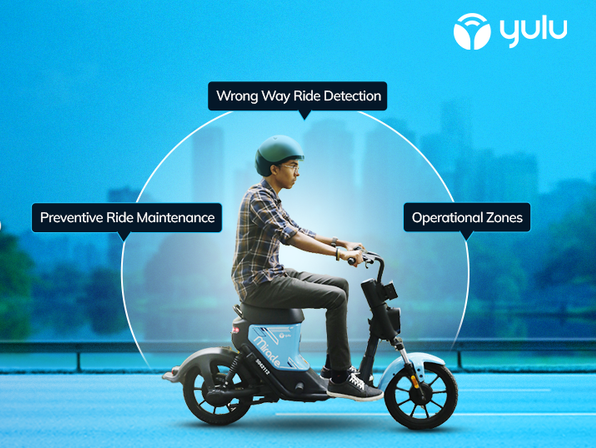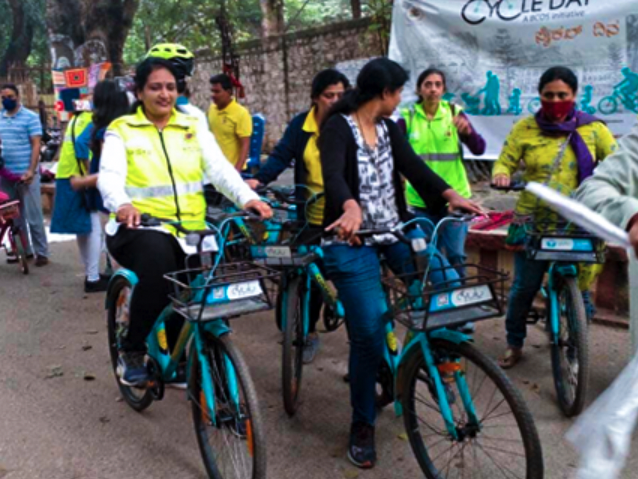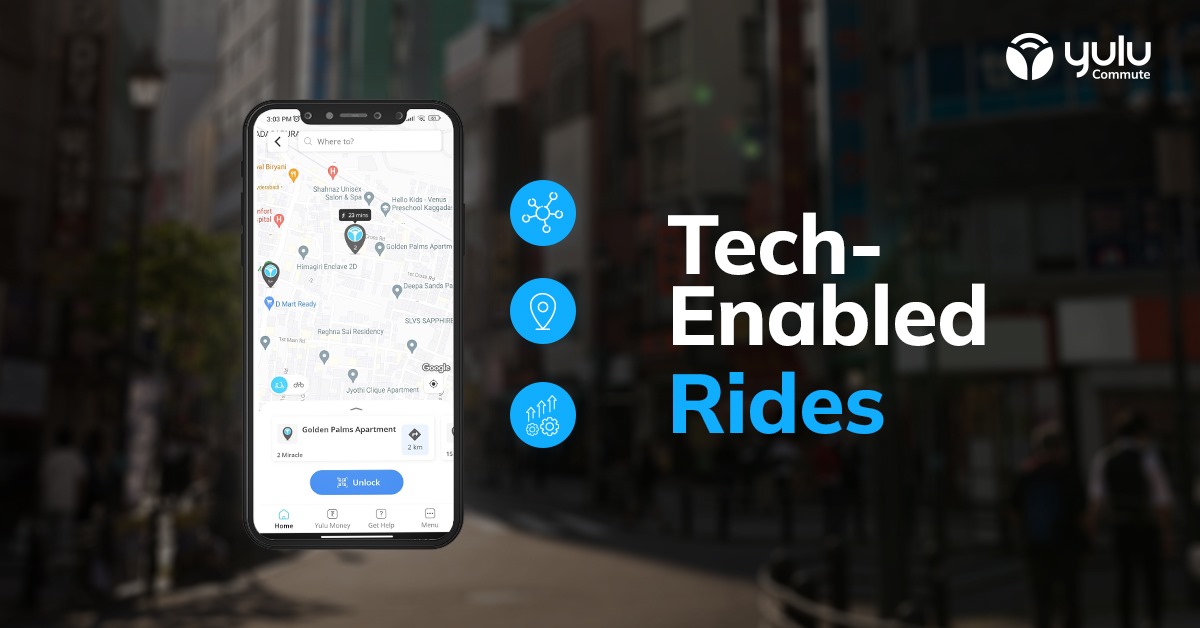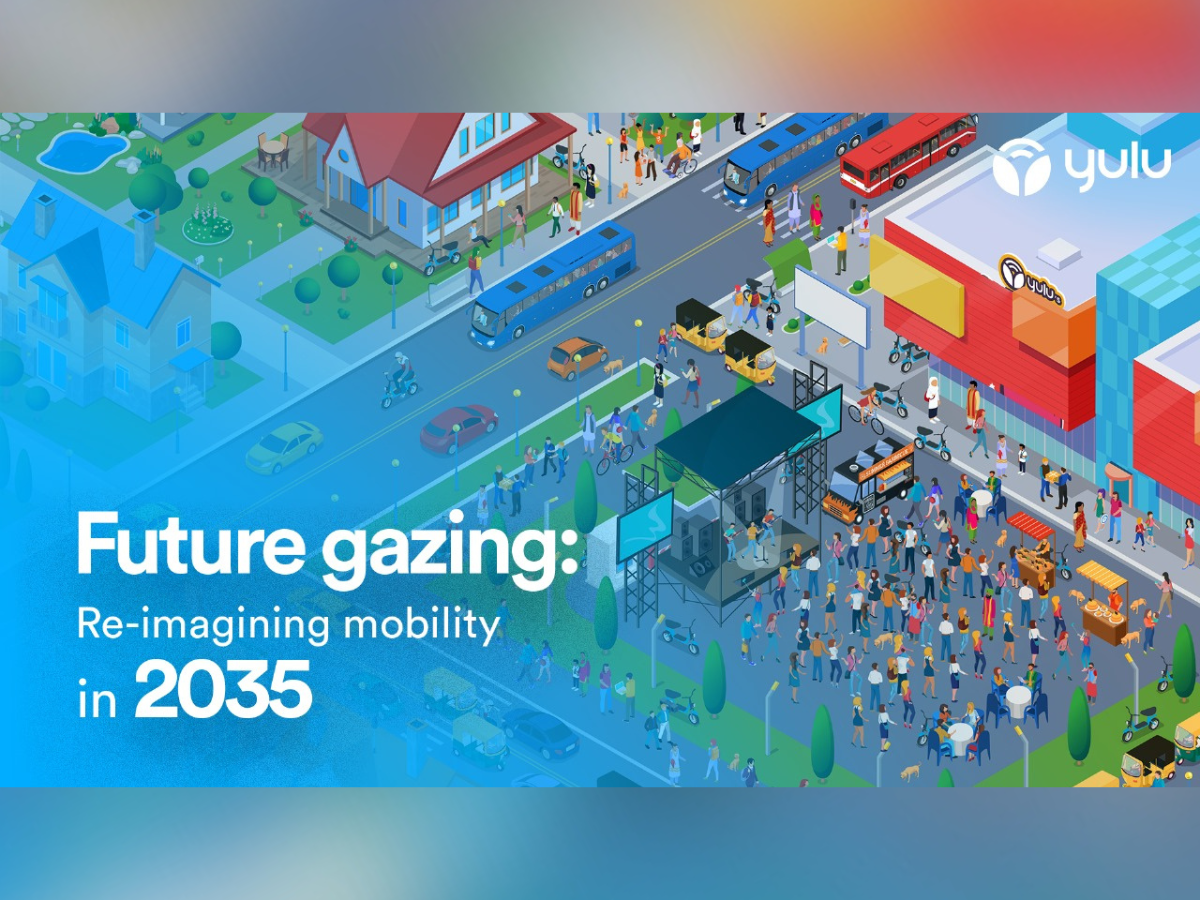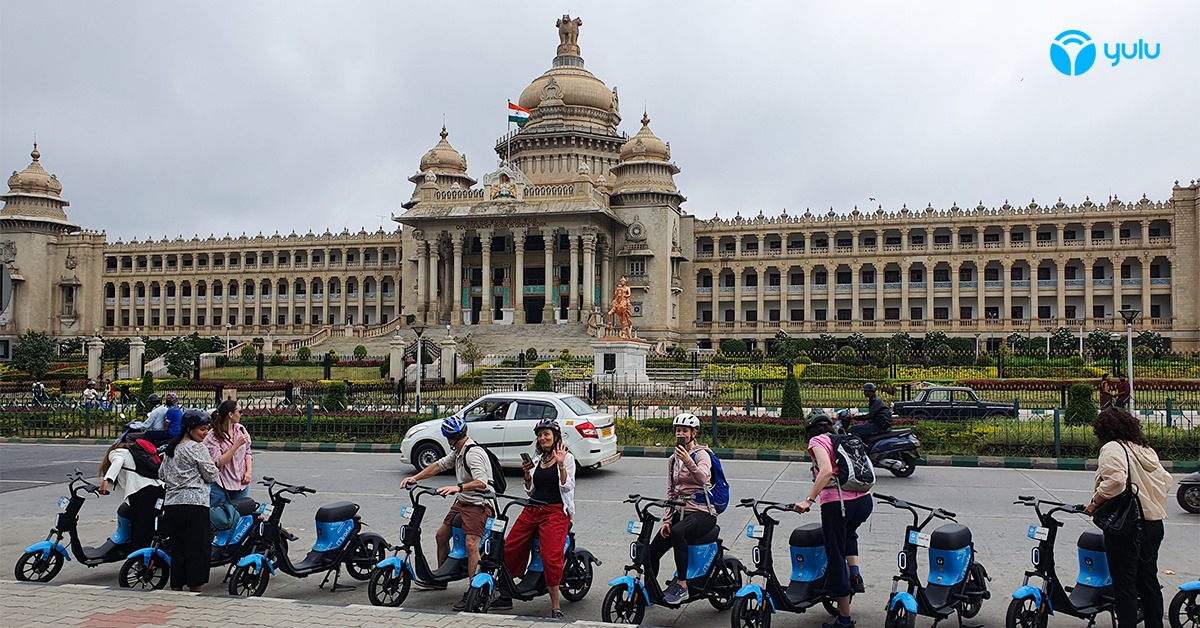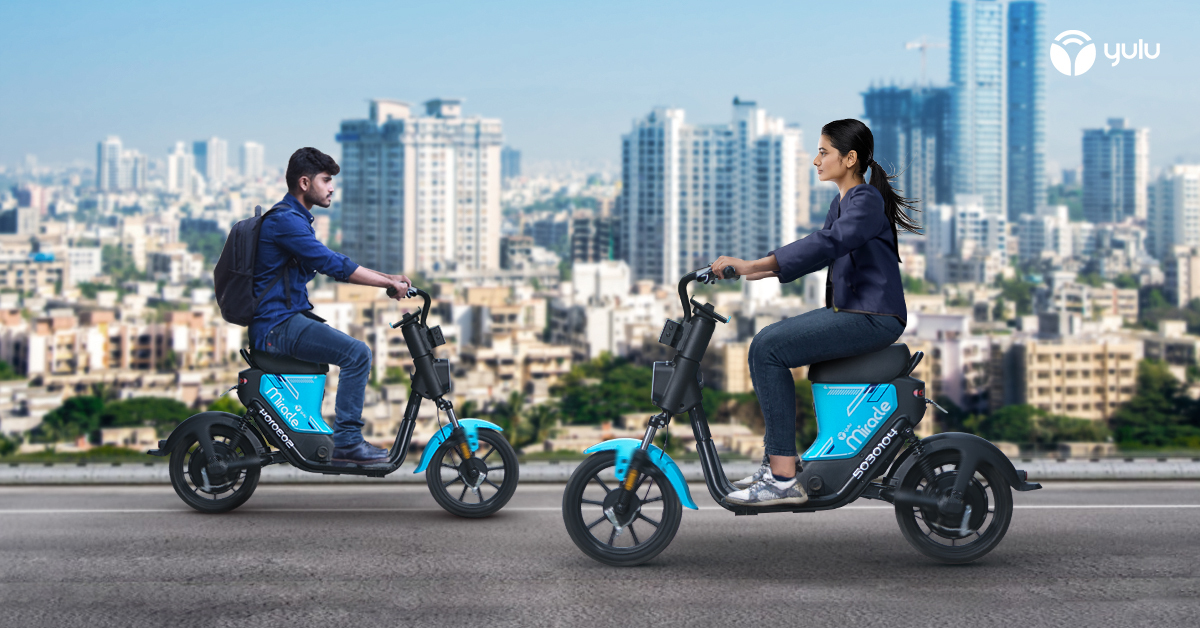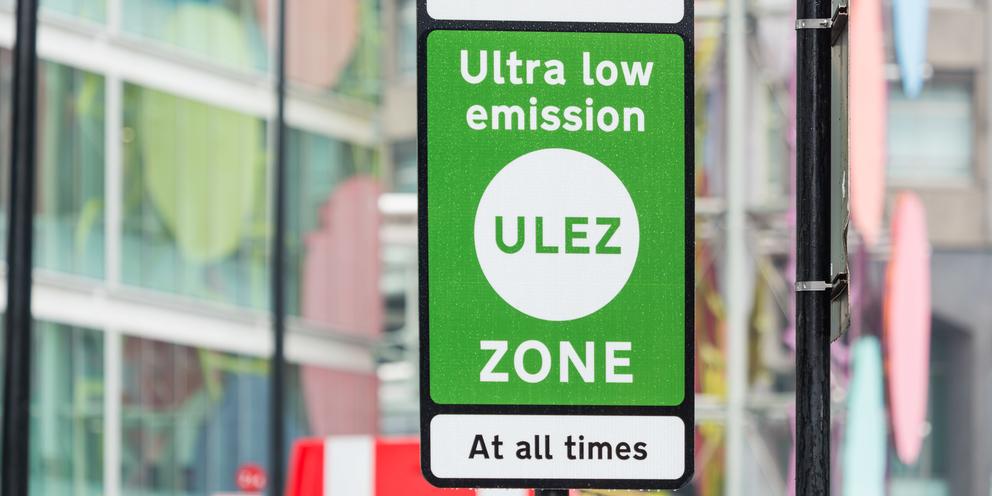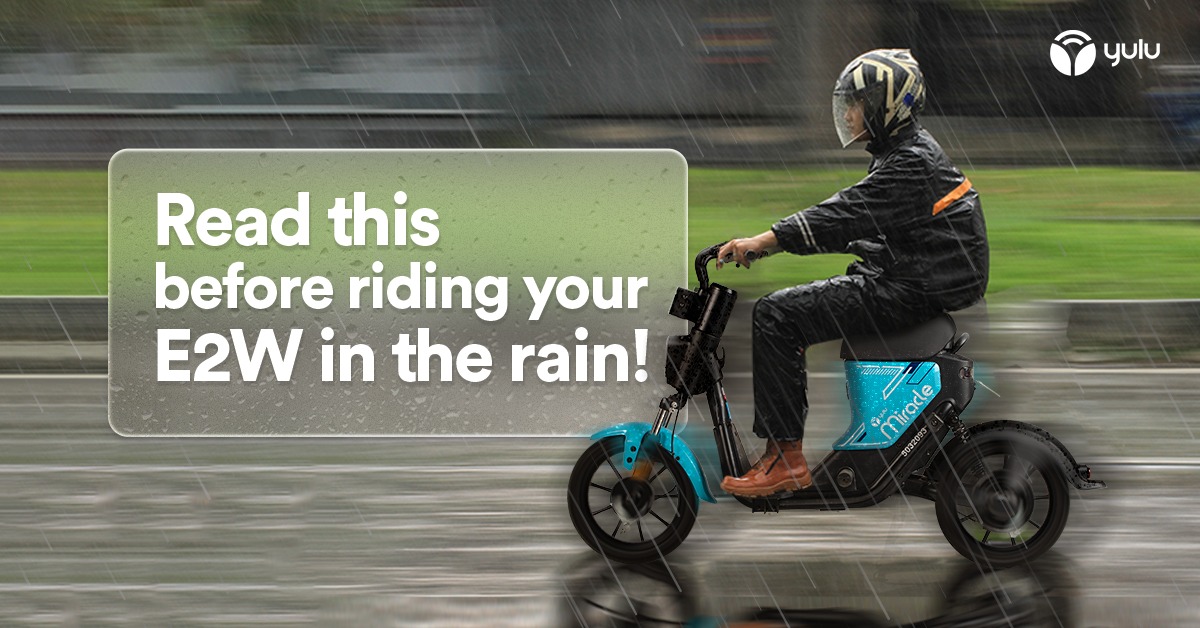Two-wheelers, including electric vehicles, make up the highest number of vehicle registrations in India.
Electric two-wheelers have been particularly gaining incredible popularity in the past few years, thanks to their environmental benefits, lower operational costs, and improvements in technology and range limits.
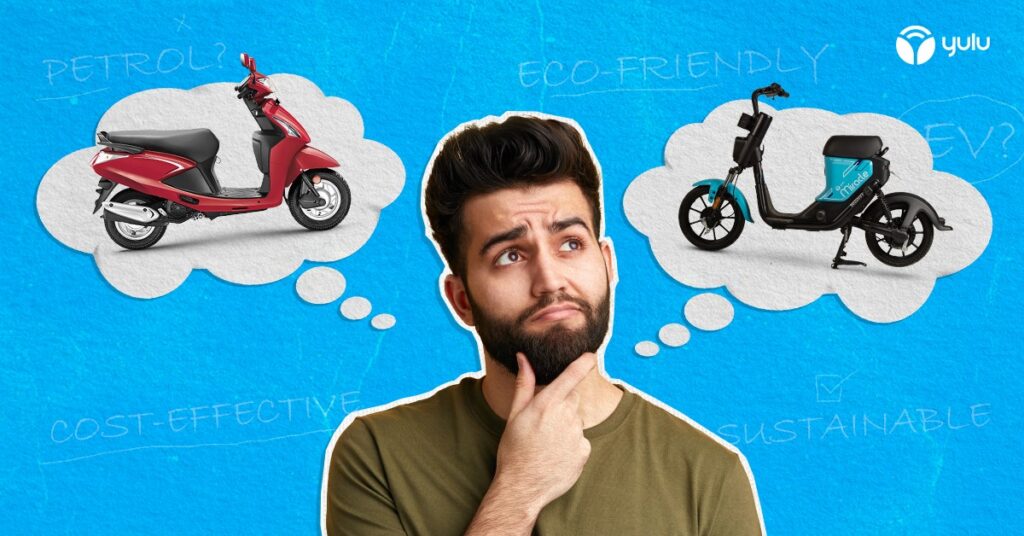
At their core, electric bikes are easy to ride, low on maintenance, and high on convenience. A study conducted to analyse the ‘transport mode shift’ behaviors towards electric 2-wheelers in four different states of India shows that users prefer two-wheelers compared to private four-wheelers and other public transport.
Many consumers are exploring various options to buy electric versions of the two-wheelers. Hence, it becomes inevitable to draw a comparison of electric bikes vs. petrol bikes. If you are confused about which one is the right fit for you, we compare both these types of vehicles on different parameters to help you make the right decision.
Why not rent and ride a Yulu to explore all its amazing benefits? Download the app for Android or iOS!
Electric Bike vs. Petrol Bike – Major Differences
1. Environmental Impact
A conventional bike burns petrol to generate energy and propel the vehicle. And since petroleum is a fossil fuel, it emits carbon dioxide and other noxious gases which are major culprits in increasing environmental pollution. Moreover, the noise pollution emitted from these vehicles adds to their adverse impact.
On the other hand, an electric bike gets its energy from a rechargeable battery that drives the motor. Since these vehicles don’t burn fuel, there are no emissions whatsoever. Therefore, when we examine the electric bike vs. petrol bike debate from the environmental perspective, the former has an edge. What’s more: since electric bikes lack engines, there is no noise and vibration which adds to the driving comfort.
2. Price and Cost-efficiency
Petrol-powered 2-wheelers have been around for a while, and are more or less well-established. However, the price gap between petrol and electric bikes, which was high 4-5 years ago, has now narrowed. The price of low-speed electric vehicles (LSEVs) is already lower than most petrol 2-wheelers from leading brands.
Moreover, in terms of cost efficiency, as electric bikes are powered by lithium-ion batteries, the expenses on fuel are nil (though you have to pay a comparatively small amount for charging), as against petrol bikes which can burn a hole in your pocket.
For example, you can take a Yulu Miracle electric bike for a ride at a base price of Rs.5, followed by Rs. 2.5 for every minute after that. There is also a one-day unlimited usage rental plan starting at Rs.299. Rental bikes have the added advantage of not involving any ownership or maintenance costs whatsoever. Further, only 5 per cent GST is levied on electric two-wheelers, which is a bonus to the end consumer.
3. Electric Bike vs. Petrol Bike – Range
The range of electric bikes is sometimes a cause of concern for daily commuters. In contrast, petrol bikes have easy accessibility to petrol stations, so this appears to be a straightforward edge over electric vehicles. However, if your purpose of riding is short distances and if you keep a close eye on the battery charge, the range shouldn’t be a problem.
There are emerging solutions to range anxiety. With the growing development of charging infrastructure, easy accessibility and high compatibility, range anxiety can be mitigated to a great extent. However, just like other electrical components, charging the battery of an electric bike takes time, especially in public places. So what can be done to solve the waiting problem? One practical solution includes renting a pre-charged bike for a short distance and then exchanging it for another one at a designated zone. Another solution for long-term rental bikes—which are used over days or weeks—is swapping the battery of the same vehicle at a swapping station.
For e-bikes like the Yulu DeX, the battery swapping stations deployed by Yuma (a joint venture of Yulu and Magna) allow you to swap your vehicle’s battery whenever your bike runs out of juice. All you need is to reserve a battery via the official app, get at a nearby Yuma station, and swap your used battery with a new one within seconds.
Read more on Why Yulu is Your Ultimate Ticket to Independent Mobility
4. Maintenance and Upkeep
Petrol bikes require regular servicing and maintenance, typically every 3-6 months. There are plenty of mechanical components in a petrol bike that are subject to wear and tear. Failing to address problems in these components can return a very bad riding experience, sometimes leaving you stranded in the middle of the road.
Contrary to this, electric bikes require much less maintenance due to fewer mechanical parts. When it comes to shared EVs like Yulu, the maintenance cost to consumers is zero, as the company bears the entire cost of maintaining the bikes.
5. Convenience of Driving in Cities
Electric bikes, especially those that fall under the low-speed electric vehicles (LSEVs) category, are a perfect option for short daily commutes. These bikes are lightweight, come with comfortable seating, and easily help riders navigate through congested roads.
And though petrol two-wheelers can also be a good way of sifting through traffic woes, the big form factor of these vehicles can not be easy to maneuver in the traffic.
6. Connectivity and Ease of Use
Petrol-powered two-wheelers have been in use in e-commerce deliveries for a while, but shared electric bikes are fast becoming a better alternative to the former. Shared EVs bridge the short distances between residential areas, office spaces and public transport hubs by offering a small, smart, and streamlined mode of travel.
And since LSEVs like Yulu have a speed limit of 25kmph, you don’t need any license to ride these bikes, and can enjoy greater riding safety.
Choose a Smart Way of Commuting with Yulu
So, which option is better for you: an electric bike or a petrol bike? You can use the above-mentioned pointers to decide which one is better and fits your lifestyle. However, if you take all factors in mind, right from cost-efficiency, and daily commute to maintenance and environment-friendliness, it is hard to neglect the importance of shared electric bikes in today’s scenario.
Yulu, offers the smartest way of urban commuting through its wide range of products, opening up several avenues for building a more connected community that is also environment-conscious. Download the Yulu app now and step into the future of sustainable urban commuting.
FAQs
Q1: Electric bikes vs petrol bikes: which one has better features?
A: The never-ending debate around electric bikes vs. petrol bikes has many aspects, and features are one of them.
While petrol bikes have their own set of advantages in terms of features, electric bikes like the Yulu Miracle are powered by IoT, Artificial Intelligence, Bluetooth and GPS to offer a convenient commute in cities. Moreover, just like petrol 2-wheelers, they have a stylish and ergonomic design to provide maximum comfort to riders.
Q2: Electric bike or petrol bike, which is better for cities?
A: If your purpose is to commute over long distances, a low speed electric bike might not be as relevant as a petrol one. However, if you are goal is to find out which is better for a city dweller, an electric bike or a petrol bike, then yes, electric bikes like Yulu are best for college goers, daily grocery shopping or getting to nearby locations quickly.
Take a ride with Yulu now! Download the app below.
This article was originally published by Yulu.


